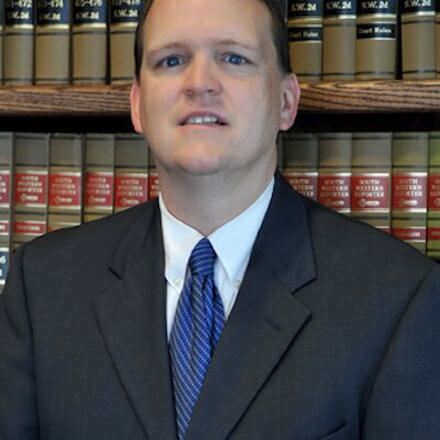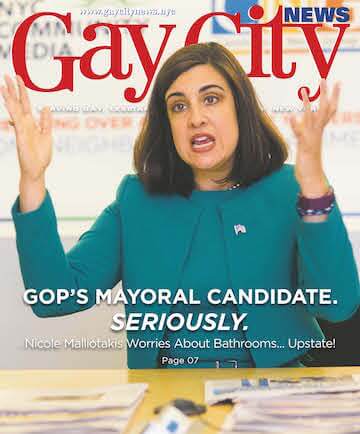Indiana Governor Mike Pence signs the state's Religious Freedom Restoration Act on March 26, with no reporters on hand. | INDIANA OFFICE OF THE GOVERNOR
In a private ceremony closed to the press but including numerous religious leaders, Indiana Governor Mike Pence, a Republican social conservative, signed what is widely described as the nation’s most sweeping law empowering businesses and individuals to claim religious exemptions from complying with state and local law.
In defending the new law, the Religious Freedom Restoration Act (RFRA) –– a named borrowed from a 1993 federal statute and similar measures passed in 19 states in the intervening years –– Pence, on March 26, asserted, “This bill is not about discrimination.” The governor made his claim despite the refusal of legislators at several points during the bill’s consideration to accept amendments excluding local nondiscrimination requirements from its provisions. And despite the fact that the measure defines a broad universe of entities that can claim religious exemptions under a vast array of situations.
Many media reports have characterized the law as giving Indiana businesses and individuals a license to discriminate –– particularly against those without specific federal civil rights protections such as the LGBT community.
Local LGBT rights protections threatened in measure with wide-ranging potential unforeseen consequences
“The Indiana General Assembly and governor have sent a dangerous and discriminatory message with this new law,” said Sarah Warbelow, the legal director at the Human Rights Campaign (HRC). “They’ve basically said, as long as your religion tells you to, it’s ok to discriminate against people despite what the law says.”
Pence signed the measure in the face of widespread concerns raised by mainstream political, business, and faith leaders.
Indianapolis Mayor Greg Ballard, a Republican, warned that it sends “the wrong signal.”
“Indianapolis strives to be a welcoming place that attracts businesses, conventions, visitors, and residents,” Ballard said. “We are a diverse city, and I want everyone who visits and lives in Indy to feel comfortable here.”
Indianapolis, unlike the State of Indiana, provides nondiscrimination protections based on sexual orientation and gender identity, which could be undermined by the new state law.
Gen Con, a gaming convention that is annually the city’s largest trade show, threatened to pull out if Pence signed the measure, and the Disciples of Christ denomination similarly warned it might cancel a scheduled 2017 convention in Indianapolis.
The NCAA, which holds its Men’s Final Four Basketball Championship in Indianapolis beginning April 4, posted a statement on its website from its president, Mark Emert, saying, “We are especially concerned about how this legislation could affect our student-athletes and employees. We will work diligently to assure student-athletes competing in, and visitors attending, next week’s Men’s Final Four in Indianapolis are not impacted negatively by this bill. Moving forward, we intend to closely examine the implications of this bill and how it might affect future events as well as our workforce.”
In a tweet addressed to the governor, Jason Collins, the out gay retired Brooklyn Nets player, asked, “.@GovPenceIN, is it going to be legal for someone to discriminate against me & others when we come to the #FinalFour?”
The measure Pence signed was also criticized by the Indiana Chamber of Commerce and employers with local workforces including Alcoa, Cummins, Eli Lilly, and Salesforce.
Building on last year’s US Supreme Court ruling in the Hobby Lobby case, which concluded that a closely held family business can assert religious rights under the First Amendment, the Indiana law defines “person” to include individuals, religious organizations, and virtually any business or non-profit organization that is able to sue or be sued.
According to Jennifer Pizer, the national law and policy project director at Lambda Legal, one thing that makes the Indiana statute more insidious than RFRAs enacted elsewhere is the provision that a “person” who believes their exercise of religion “has been substantially burdened, or is likely to be substantially burdened,” can assert that claim “regardless of whether the state or any other governmental entity is a party to the proceeding.”
That is significant, Pizer noted, because of how a New Mexico photographer’s claim he could deny his services to a same-sex couple for their wedding, despite that state’s nondiscrimination law, was resolved under the RFRA enacted there. Finding that the case was a civil dispute between two parties that did not involve the government, the State Supreme Court ruled that the photographer could not claim a religious exemption. The same photographer, under the Indiana law, would be able to make his claim, both Pizer and Shannon Minter, legal director at the National Center for Lesbian Rights (NCLR), agreed.
In his signing statement, Governor Pence asserted otherwise, saying of the measure, “If I thought it legalized discrimination in any way in Indiana, I would have vetoed it. In fact, it does not even apply to disputes between private parties unless government action is involved.”
“He’s wrong,” Lambda’s Pizer said.
NCLR’s Minter echoed Pizer, saying, “Pence’s statement is blatantly untrue.”
The measure’s language, Pizer said, also provides a broad definition of what triggers a religious burden from which someone can claim an exemption. Even the belief that their exercise of religion “is likely to be burdened” –– rather than demonstrating an actual burden suffered –– allows a person to claim a religious exemption.
“The usual rule is that a legal claim isn’t ripe unless and until the allegedly harmful event takes place,” Pizer said.
Pizer and Minter offered different assessments on another provision of the Indiana law, one that allows a religious exemption claim “even if the burden results from a rule of general applicability” –– in other words, laws that apply to everyone but have an incidental, but unintended impact on the exercise of religion.
“That clause is standard in RFRAs,” Pizer said. Looking to the history behind enactment of the federal RFRA in 1993, she noted that the Supreme Court, in a 1990 opinion by Justice Antonin Scalia, found that religious freedom does not provide exemptions from laws of general applicability. Congress, in an effort to redress what it saw as the resulting weakness in the freedom afforded for the exercise of religion, responded with RFRA, which specifically allowed such exemptions unless the government can show a compelling interest addressed in the least restrictive manner.
In Minter’s view, however, the Indiana law’s language regarding laws of general applicability “is an extremely unusual provision and further evidence that the drafters of this bill are attempting to create a huge, virtually unqualified license to discriminate — and throwing out the window the longstanding limits on RFRAs. This is not about protecting religious liberty, this is about creating special religious entitlements to discriminate and violate other laws.”
New York Law Professor Arthur S. Leonard, Gay City News’ legal correspondent, pointed to another unusual provision in the Indiana statute –– the vague formulation of what constitutes the exercise of religion. The definition in the law “includes any exercise of religion, whether or not compelled by, or central to, a system of religious belief.” Apparently, Leonard noted, the “church of one” will do as the basis for claiming an out.
In assessing the Indiana statute, Lambda’s Pizer took pains to emphasize that its most insidious implications can yet be challenged head on. The Indianapolis nondiscrimination ordinance –– and other local enactments across the state –– she said, “may still be enforced if a court appropriately finds that there’s a compelling interest in enforcing it and that doing so is the least restrictive means of serving that interest.”
At the same time, she cautioned, “post-Hobby Lobby, the legal standards have been changed in uncertain, worrisome ways.”
Indiana courts or the federal courts would have to accept the proposition that combatting discrimination based on sexual orientation or gender identity served a compelling government interest –– a finding that is certainly no foregone conclusion.
Observers who have been following the developments in Indiana have uniformly concluded the measure gained traction as a response to the Seventh Circuit Court of Appeals decision last year striking down that state’s ban on marriage by same-sex couples. Pence, denying any discriminatory intent, grabbed onto what he apparently saw as a safer harbor in explaining Indiana’s need for this legislation.
“One need look no further than the recent litigation concerning the Affordable Care Act,” the governor said in his signing statement, in a reference to controversy over the Obamacare requirement for contraceptive coverage in employer healthcare plans. “A private business and our own University of Notre Dame had to file lawsuits challenging provisions that required them to offer insurance coverage in violation of their religious views.”
Though Pence is surely disingenuous in denying that this bill represents a backlash against gay and lesbian gains on the issue of marriage equality, his statement highlighted another concern critics of the law have raised: that the breadth of exemption claims this bill makes possible under any state or local ordinance from Indiana’s nearly 8.5 million “churches of one” has virtually untold potential for mischief going forward.
Meanwhile, mischief of another sort continues to grow nationwide. The danger currently looming largest on the horizon is a religious exemptions bill working its way through the Georgia Legislature –– which has provided no statewide protections based on sexual orientation and gender identity –– that could gut anti-discrimination measures in Atlanta and other municipalities and counties. A recent HRC tabulation of measures aimed at curbing LGBT rights –– through religious exemption laws, nullification of local protections that go beyond state law provisions, bills that target the use of sex-segregated facilities like bathrooms and locker rooms by transgender people, and laws promoting conversion therapy for LGBT youth –– identified 85 bills pending in 26 legislatures across the country.
In addition to the new Indiana law, Arkansas last month enacted a measure that bars local governments from providing any civil rights protections not established in state law. Utah this month adopted a measure that for the first time offered statewide protections based on sexual orientation and gender identity, though even its boosters acknowledged that it was enacted under the constraints of existing state law with the nation’s most sweeping religious exemptions –– which, in some instances, were only strengthened.


































